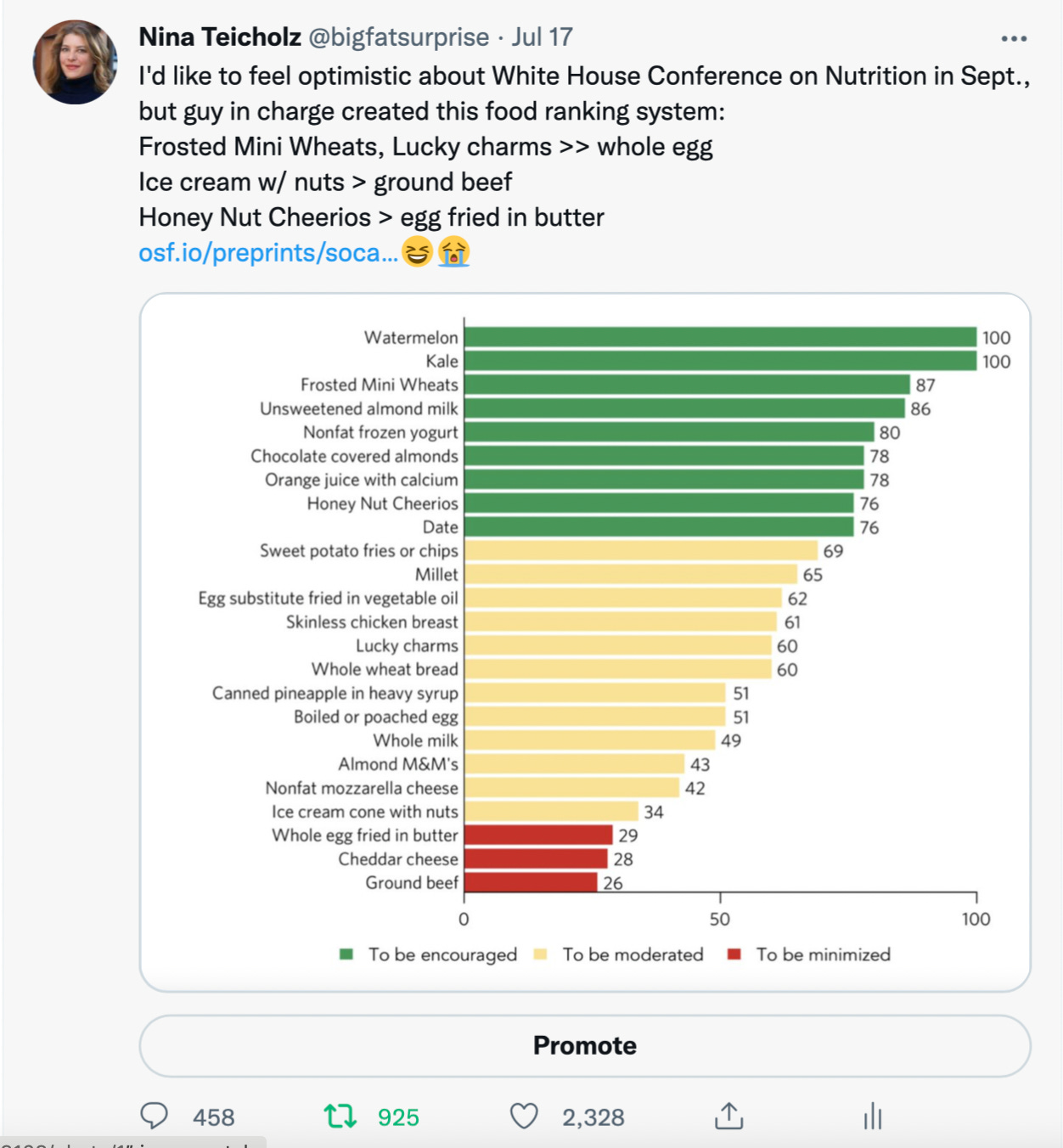Cheerios a Health Food, Says Leader of White House Conference on Nutrition
Cheerios a Health Food, Says Leader of White House Conference on Nutrition
Dean of Tuft's Nutrition School Gives Top Rankings to Sugary Cereals
Recently I had a popular tweet, which I thought I’d share it with you—since it helps understand why one might have doubts about the upcoming White House Conference on Hunger, Nutrition and Health, billed as the biggest event on food policy in more than fifty years.
Here’s the tweethttps://twitter.com/bigfatsurprise/status/1548730633953968128:
(Full food-item rankings can be found here.)
This food scoring system, called the “Food Compass,” was published in Nature Food in 2021, with lead author, Dariush Mozaffarian, who is the Dean of the Tufts Friedman School of Nutrition Science and Policy at Tufts University. Mozaffarian and Tufts have also led the development of the White House conference slated for sometime in September.
The Food Compass, which gives top ratings to Cheerios, Lucky Charms and Cocoa Puffs, is absurd on the face of it. In all, nearly 70 brand-named cereals from General Mills, Kellogg’s, and Post are ranked twice as high as eggs cooked in butter or a piece of plain, whole-wheat toast. Egg whites cooked in vegetable oils are also apparently more healthy than a whole, boiled egg, and nearly all foods are healthier than ground beef.
Tufts University touts the Food Compass as the “most comprehensive and science-based” nutrient profiling system to date that “clears up confusion to benefit consumers, policymakers.” Created by a team of Tufts researchers under the leadership of Mozaffarian, the project ranks 8,032 foods and took three years to complete.
What kind of dystopian world has nutrition “science” entered into whereby a university, a peer-reviewed journal, and one of the field’s most influential leaders legitimize advice telling the public to eat more Lucky Charms and fewer eggs? Simply eyeballing these recommendations should be enough to know this diet is a get-sick, diabetes diet, a high-carb, sugar-laden, candy-coated highway to ill-health.
An academic critique of the Food Compass should be superfluous, but it does help explain some of the assumptions leading to these bizarre results. (The chart above is from this article.) For instance, the Compass:
· Automatically assigns negative scores to red meat and dietary cholesterol;
· Puts a low priority on protein, giving it equal value to fiber and phytochemicals;
· Makes no distinction between nutrients obtained from animal foods versus those from plants or the artificial nutrients added to enriched, fortified foods—even though most nutrients are in their most bioavailable forms in animal foods.
Each of these assumptions is contradicted by substantial data to the contrary. Just take the subject of dietary cholesterol, for example. The science on this topic was systematically reviewed by the American Heart Association in 2013, and the U.S. Dietary Guidelines expert committees in 20151 and 20202. All these reviews found no link between cholesterol in the diet and cholesterol in the blood. It turns out that restricting eggs and shellfish is ineffective, since the body simply adjusts its own cholesterol production to keep a steady amount available for the body’s many essential functions. Ranking “egg whites” higher than a whole egg, as the Food Compass does, is therefore not supported by the evidence. Outdated hypotheses die hard, we know, but the dean of a nutrition school should be up-to-speed on the latest science.
Since Mozaffarian is widely credited with being the driving force behind the upcoming White House conference, his views on nutrition are worth examining. If he and his team at Tufts really think Frosted Mini Wheats are a super food, there’s clearly reason to have some concerns about the outcome of this event.
More on that in a future newsletter.
The expert committee said it would “not bring forward this recommendation [on cholesterol caps] because available evidence shows no appreciable relationship between consumption of dietary cholesterol and serum cholesterol…” and “[c]holesterol is not a nutrient of concern for overconsumption.”
Part D, Chapter 9, p. 12.

Comments
Post a Comment